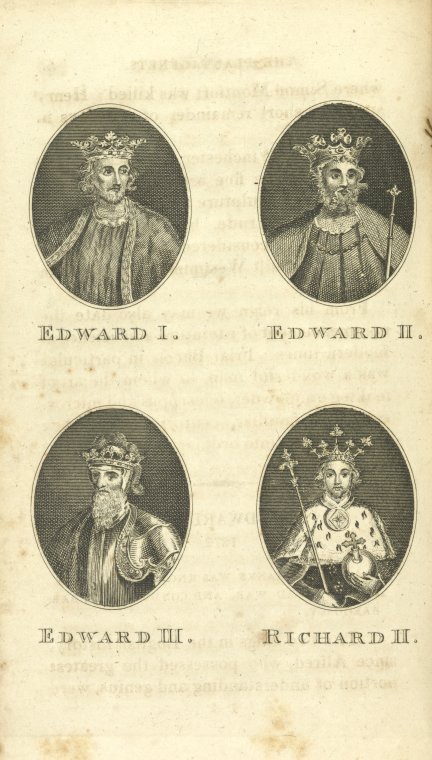JohnOfGaunt

Publisher: William Godwin:
Edward I. Edward II. Edward III. Richard II (1815)
"We're certainly directly related to almost everybody."
How does the progeny of a King and Queen of England manage to lose their rights of association? It was always easy to lose the right of ascension. That required no more than the good fortune not to be the first-born male. The rights of association proved tricker, though, for they depended upon custom and political positioning. Stay in good graces with the crown, and you and your offspring might hang around the household for centuries. Somehow fall out of favor, and you and yours will disappear, sometimes into formal exile and other times more permanently. There seems to have been little permanent sentimentality between members of the upper reaches of royal society. Anybody—and I do mean anybody—could be excommunicated on any premise on the whim of a king, queen, or even senior advisor. Not even offspring were necessarily excepted.
Rejected ones could try again by attempting to marry themself off to some handy neighboring monarch. Marrying the daughter of an enemy proved to be a reliable means of recovering lost stature while brokering some welcome peace. Some exiles, though, were intended to be essentially permanent. This happened to my 17th great-grandfather, John Beauford. His father, John of Gaunt, the fourth son of King Edward III, the grandson of Edward I and Eleanor of Castile, was never seriously considered part of the succession. However, when his ten-year-old nephew Richard II took the throne, he became his closest adviser and the virtual driver of the monarchy for a few years.
John of Gaunt had served in a dizzying array of positions throughout his life, though reliably proved to be an unreliable military commander. He led several attempts to claim French territory during The Hundred Years War, almost always failing. To be fair, the mid-fourteenth century was a devil of a time to be trying to pull off invasions. The Black Plague was actively ravaging France at the time. There is nothing like showing up to liberate a city under siege only to find Plague welcoming you. He lost more soldiers to disease than he ever lost to enemy armies.
He was, though, a reasonably nimble politician. Given his father's extensive military excursions, particularly against the Scots and the French, the crown had gone from enjoying extreme wealth to feeling forced to increase taxation. The peasants, as well as the barons, complained. As a result of his apparent association with unjust taxation, John of Gaunt was held in considerable disgust among virtually everyone vital to him fulfilling his missions. He became enormously wealthy and must have been a formidable politician, given that he was frequently vilified and often associated with the worst excesses of his father's and Richard II, his nephew's, reigns.
He took a mistress before his second wife's death, Katherine Swynford, who bore four children, including John Beauford, my progenitor. John of Gaunt had chosen the surname Beauford for his illegitimate offspring. Though these children were later declared legitimate, after Gaunt and Swynford married once Constance of Castile died, the parliament twice insisted that these offspring and their progeny never be considered for succession. This decision was later confirmed by Henry IV, as well as by Pope Boniface IX. The children each took prominent political positions, John Beauford becoming a distinguished military leader and declared 1st Earl of Somerset. Late in life, he was named Lord High Constable of England, seventh of the Great Officers of State, ranking beneath the Lord Great Chamberlain and above the Earl Marshal. These were doubtless prestigious roles but hardly royal. I intend to find where my Fambly became lowly commoners, but I suspect it will involve religion.
Still, John Beauford’s granddaughter, Lady Margaret Beaufort's son, would claim the throne as King Henry VII of England. Mysterious ways continued.
John of Gaunt was a patron and close friend of the poet Geoffrey Chaucer, best known for his work The Canterbury Tales. Near the end of their lives, Gaunt and Chaucer became brothers-in-law. Chaucer married Philippa (Pan) de Roet in 1366, and Gaunt took his mistress of nearly 30 years, Katherine Swynford (de Roet), who was Philippa Chaucer's sister, as his third wife in 1396. Although Philippa died c. 1387, the men were bound as brothers, and Gaunt's children by Katherine—John, Henry, Thomas, and Joan Beaufort—were Chaucer's nephews and niece.
It's little surprise that I'm directly descended from John of Gaunt. Indeed, the succeeding royal family has been related to him since then. "The geneticist Adam Rutherford has calculated Edward III had over 300 great-great-grandchildren and, therefore, over 20,000 descendants by 1600. Thus, by the 21st century, it is "virtually impossible" that a person with a predominantly British ancestry is not descended from Edward III, as they would have around 32,000 ancestors from 1600.[199][200] Conversely, Rutherford has calculated that statistically, the odds on a 20th-century British person not being descended from Edward III is 0.995 to the 32,768 power = 4.64 × 10−72." Wikipedia
The primary difference between those with and without fascinating histories seems to be the absence of records rather than any lack of prominent ancestors. We're certainly directly related to almost everybody.
©2024 by David A. Schmaltz - all rights reserved


